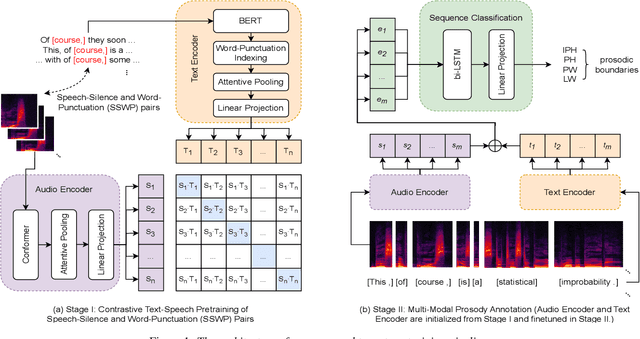Multi-Modal Automatic Prosody Annotation with Contrastive Pretraining of SSWP
Paper and Code
Sep 11, 2023

In the realm of expressive Text-to-Speech (TTS), explicit prosodic boundaries significantly advance the naturalness and controllability of synthesized speech. While human prosody annotation contributes a lot to the performance, it is a labor-intensive and time-consuming process, often resulting in inconsistent outcomes. Despite the availability of extensive supervised data, the current benchmark model still faces performance setbacks. To address this issue, a two-stage automatic annotation pipeline is novelly proposed in this paper. Specifically, in the first stage, we propose contrastive text-speech pretraining of Speech-Silence and Word-Punctuation (SSWP) pairs. The pretraining procedure hammers at enhancing the prosodic space extracted from joint text-speech space. In the second stage, we build a multi-modal prosody annotator, which consists of pretrained encoders, a straightforward yet effective text-speech feature fusion scheme, and a sequence classifier. Extensive experiments conclusively demonstrate that our proposed method excels at automatically generating prosody annotation and achieves state-of-the-art (SOTA) performance. Furthermore, our novel model has exhibited remarkable resilience when tested with varying amounts of data.
 Add to Chrome
Add to Chrome Add to Firefox
Add to Firefox Add to Edge
Add to Edge